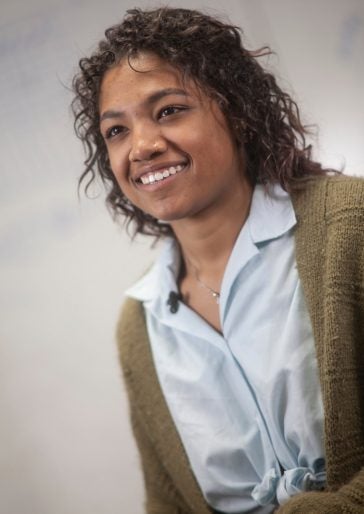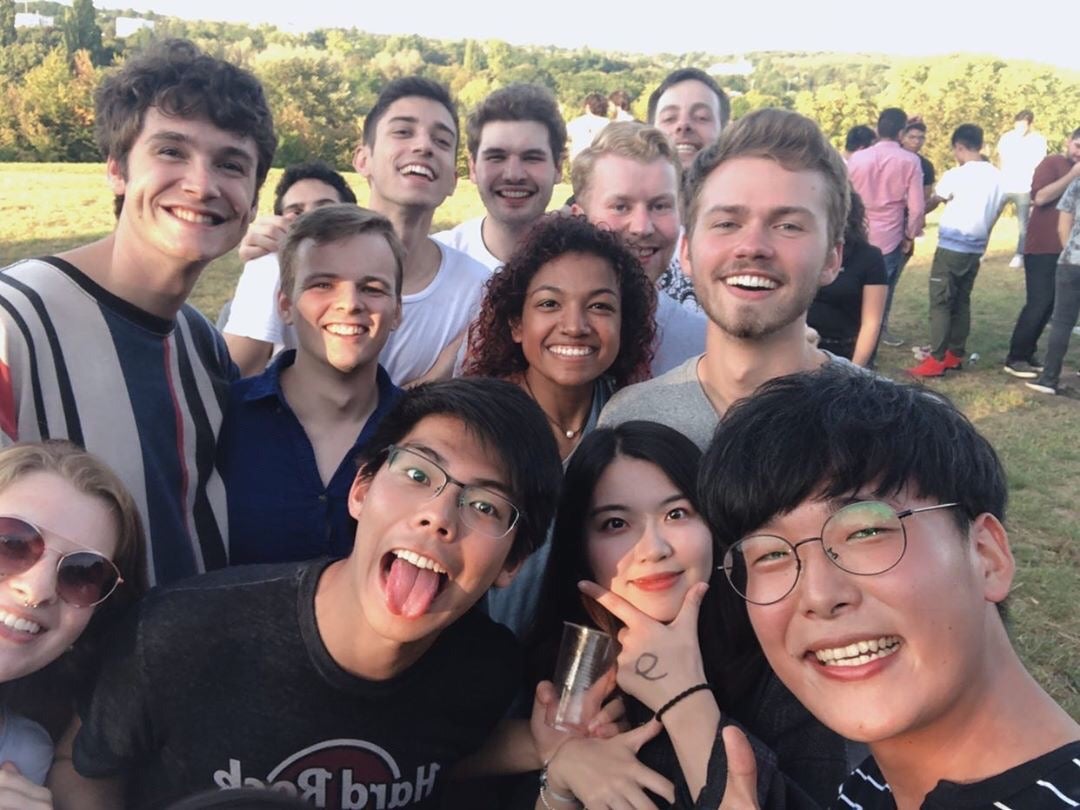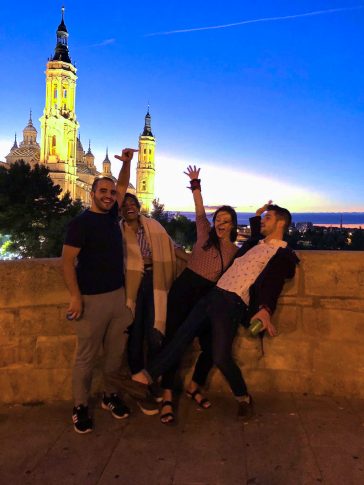By Grace Kelly
Vanessa Kamara ’21 thinks engineering has a lot to learn from nature.

“I’m a curious person,” says biomedical engineering student Vanessa Kamara ’21. “I have lots of questions.”
Dressed in ripped jeans and sporting a nose ring, with the tips of her dark hair dyed bright magenta, she sips iced coffee and talks about her work—the kind of research she’s interested in and why.
She wants to find ways to improve healthcare by drawing inspiration from nature. “I’ve always been interested in health care, and I want to learn how to make it better,” she says. “There are so many things we don’t know. I have textbooks that basically say, ‘This is what this thing is called, but we don’t really know what it does. That’s all we have for you.’”
Kamara isn’t satisfied with that. She wants to do research that leads to answers, explanations, and solutions.
“You know lactic acid, the stuff that, when you run or work out, makes your legs hurt?” she asks. “Well, I was working with a grad student on a project that takes lactic acid strands and layers them on a substrate to create a biodegradable sensor.” The sensor is intended for use in the shoes of Parkinson’s patients to track their motions; after use, it could safely degrade without harming the environment. “It would be eco-friendly and allow us to collect data.”
Kamara’s interest in the environment and eco-friendly design is rooted in her childhood. She grew up in Brooklyn Park, a suburb of Minneapolis, but spent many weeks of her childhood visiting her grandparents’ farm, where they grew sweet corn, soybeans, and barley. She and her siblings would run through the cornfields, emerging with a feeling of slight pain in the skin on their faces. “I later learned that it was probably from pesticides,” she says. This connection between health and the environment, and the idea that we should learn from nature and not harm it, was furthered when she took a general biology course in high school.
“We learned a lot of things, and I really liked learning about all the smaller body parts and systems, because everything within the body just comes together so perfectly. I’ve found that many of engineering’s best processes are biology-inspired,” she says. “That’s another reason the environment is important, we need to learn from it so that we can do better.”

At URI, she’s taken that idea—learning from nature—and applied it to understanding the human body using circuit-based engineering. One project she worked on involved using circuits and software to monitor the brain waves of a subject who was controlling a ball on the computer screen. “I like anything that is neuroscience or brain-related,” she says. “One project that really inspired me was one in which rehabilitative engineering was applied to help people who had lost the ability to walk. They used the science and engineering to gradually take supports away and retrain the brain. It was amazing.”
As part of URI’s German International Engineering Program, Kamara took her curiosity and drive across the Atlantic to Germany, studying at Technische Universität Darmstadt and working at the Machine Learning and Data Analytics Lab at Friedrich-Alexander Universität as part of URI’s globally-recognized International Engineering Program (IEP).

“We’re using sensors measure dyes moving around in mouse brains and processing these brain signals to create a new model and road map of how cells communicate.” Kamara says. “We want to know how the brain works, how these cells communicate. I’m coding in Matlab and Python to make models that see these brain connections.” And Kamara is confident in the outcomes. “It is so rewarding to be a part of this discovery.”
Kamara says that living, working, and learning in Germany is both challenging and lots of fun. “Culturally, I’m learning that Germans work hard but also know how to have fun and are not afraid to avoid burnout. I’ve also learned how to be independent. I’m in a new country, working in German in highly technical subjects,” she continues. “But after a few weeks, I was making friends, taking weekend trips around Europe, and feeling confident.”
“I’m excited to experience another culture and work in the field—opportunities that many engineering students don’t have. Biomedical engineering is such an exciting field with so much potential,” Kamara says. “My curiosity has only just started.”

I am so proud of the woman you have become Vanessa Kamara. Keep up the good work, and make your mark in the world if science. Aunty loves and misses you
???? God bless sweetheart
Ness you are the most ambitious and hard working young lady. Your drive for hard work is no surprise to us because you are from parents and family members of hard workers. May God continue to give you the ability to analyze and interpret your research finds.
#proudauntie